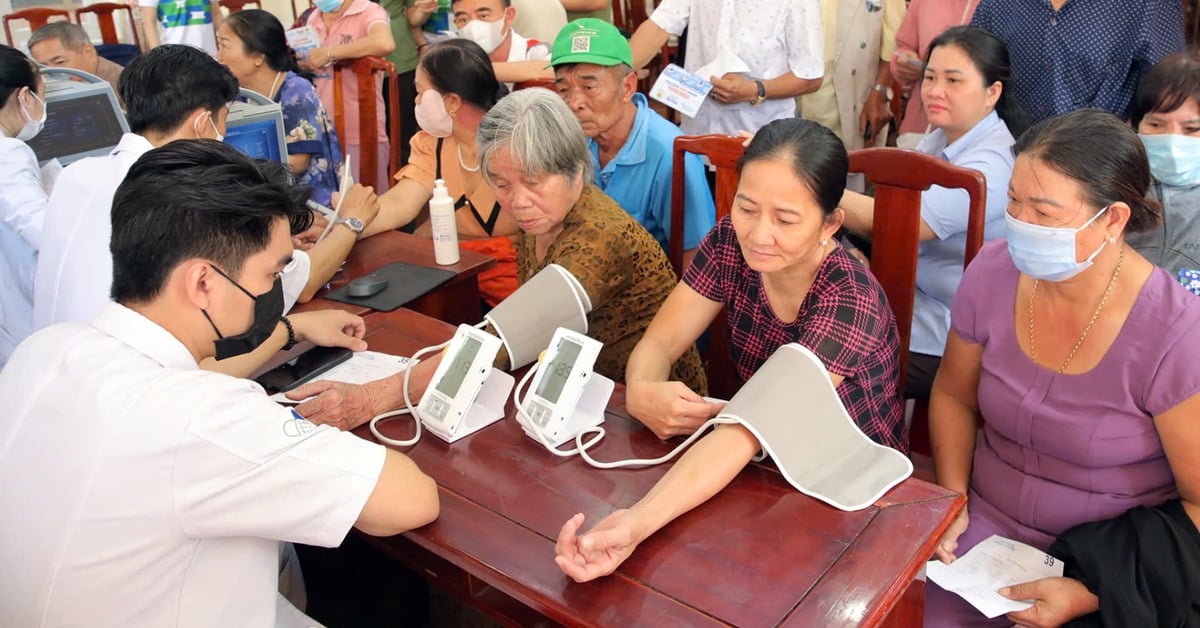Seasonal influenza is an infectious disease caused by influenza viruses of the Orthomyxoviridae family, which includes three main groups: A, B, and C. Influenza requires hospitalization when there are serious symptoms such as high fever lasting more than 3 days, difficulty breathing, chest pain, and purple lips.
Medical news on February 7: Flu requires hospitalization when symptoms are severe
Seasonal influenza is an infectious disease caused by influenza viruses of the Orthomyxoviridae family, which includes three main groups: A, B, and C. Influenza requires hospitalization when there are serious symptoms such as high fever lasting more than 3 days, difficulty breathing, chest pain, and purple lips.
When should you be hospitalized for flu?
Influenza A is the most common strain and has the potential to spread into an epidemic. Influenza can cause dangerous complications, especially for high-risk groups such as children, the elderly, pregnant women and people with chronic diseases.
 |
| Seasonal flu symptoms usually appear after 1 - 4 days of incubation and include high fever (usually above 38°C), chills, fatigue, muscle and joint pain. |
Seasonal flu is caused by influenza viruses, which fall into three main groups. Influenza A mainly causes epidemics in humans and animals, and is usually more dangerous (e.g. H1N1, H3N2).
Influenza B only spreads among humans and usually causes milder illness, while influenza C is rare and does not cause epidemics. Influenza viruses spread mainly through respiratory droplets when an infected person coughs, sneezes, or talks.
It can also be transmitted through direct contact with a contaminated surface and then touching your eyes, nose, or mouth. Closed and poorly ventilated spaces are also ideal conditions for the virus to spread.
Seasonal flu symptoms usually appear after 1 - 4 days of incubation and include high fever (usually above 38°C), chills, fatigue, muscle and joint pain.
Other symptoms may include a dry cough, sore throat, stuffy or runny nose. The flu can last from 3 to 7 days, but coughing and fatigue can linger for weeks after the illness clears. The flu can also cause headaches, sore eyes, nausea or diarrhea (especially in children).
Although most cases of influenza are benign, seasonal influenza can cause serious complications, especially in high-risk groups. Pneumonia is the leading complication, which can lead to death.
Other complications include sinusitis, otitis media, and exacerbation of chronic conditions such as asthma, COPD, or cardiovascular disease. In rare cases, influenza can also cause encephalitis and myocarditis.
Influenza requires hospitalization when severe symptoms such as high fever lasting more than 3 days, difficulty breathing, chest pain, and purple lips occur. Influenza symptoms are more severe in high-risk groups such as the elderly, children, pregnant women, and people with underlying medical conditions. Timely hospitalization and treatment not only help reduce the risk of death but also limit dangerous complications.
Preventing seasonal flu not only helps protect yourself, but also reduces the risk of spreading it in the community. The most effective way to prevent it is to get a flu vaccine every year, as the vaccine is updated to match new strains of the virus. Priority groups for vaccination include children over 6 months of age, the elderly, pregnant women, and people with underlying medical conditions.
Personal hygiene is also important. Wash your hands frequently with soap or hand sanitizer, cover your cough or sneeze with a tissue or your elbow, and avoid touching your eyes, nose, or mouth with unwashed hands.
Limit contact with sources of infection, avoid close contact with people suspected of having the flu, and stay home if you have flu symptoms. Make sure your living space is airy, clean, and keep your body warm during the winter.
Seasonal flu can cause dangerous complications if not detected and treated promptly. A typical example is the case of patient LVT (58 years old), currently being treated at the Central Hospital for Tropical Diseases.
Previously, the patient had symptoms of cough, fever and difficulty breathing. After self-treatment at home without improvement, the patient was transferred to the hospital and confirmed positive for influenza A.
Despite intensive treatment, the patient's condition deteriorated, leading to severe respiratory failure and the need for ECMO (extracorporeal membrane oxygenation). The patient was placed on a ventilator and is currently in critical condition.
Health experts stress that people with underlying medical conditions or weakened immune systems need to be especially careful when infected with the flu, as it can cause serious complications such as lung damage, bacterial superinfection, myocarditis and multiple organ failure.
People with chronic obstructive pulmonary disease are more likely to have serious complications from the flu. Therefore, early detection and treatment of the flu is extremely important to prevent dangerous complications. Doctors also recommend that patients with underlying medical conditions get an annual flu vaccine and follow personal protective measures.
Seasonal flu vaccination uptake is on the rise
Influenza vaccines are up to 90% effective in preventing illness, reducing the risk of death from all causes by 47%, reducing the risk of hospitalization for pneumonia and reducing the risk of myocardial infarction by 15-45%.
After receiving information about the increase in flu in some countries and in Vietnam, many people have proactively sought information and gotten vaccinated against flu to protect their health.
According to the National Children's Hospital, seasonal flu is currently breaking out strongly in a number of countries, especially Japan. In Vietnam, the winter-spring weather creates favorable conditions for respiratory pathogens, including seasonal flu.
Doctors at the National Children's Hospital recommend that parents should recognize early symptoms of seasonal flu so that they can take their children to the hospital for examination in time to avoid dangerous complications. In particular, flu vaccination is an effective measure to protect the health of children and their families.
According to the VNVC Vaccination System, the number of people seeking information and getting vaccinated against influenza has increased sharply, nearly 200% compared to normal days. In particular, the proportion of adults, including the elderly, getting vaccinated against influenza accounts for nearly 50%.
Dr. Bach Thi Chinh, Medical Director of VNVC Vaccination System, said that flu vaccines are reasonably priced but highly effective in protecting against dangerous complications caused by flu. Flu vaccination helps create specific antibodies against the flu virus, protecting the body from getting sick and reducing the severity of the disease when it occurs.
In particular, for the elderly and those with underlying medical conditions, influenza vaccination can reduce influenza-related mortality by 70-80%. Studies show that influenza vaccination also helps pregnant women reduce the risk of stillbirth by 51% and the risk of hospitalization for infants under 6 months of age by 72%.
According to medical experts, the best time to get a flu vaccine is as early as possible, especially in winter and spring when flu epidemics tend to increase. The World Health Organization (WHO) affirms that getting vaccinated fully and on schedule is the most effective way to prevent seasonal flu. Flu vaccines have been proven safe and effective for over 60 years.
In Vietnam, influenza viruses can circulate all year round, with peaks usually occurring in March-April and September-October each year. Therefore, getting a flu vaccine as early as possible will help protect your health best.
In addition to protecting individuals, influenza vaccines are also effective in preventing the disease in vulnerable populations such as people over 65 years of age, pregnant women, children under 5 years of age, and people with underlying medical conditions such as asthma, diabetes, heart disease, cancer, and HIV/AIDS. The U.S. Centers for Disease Control and Prevention (CDC) recommends that everyone get vaccinated against seasonal influenza, especially high-risk groups.
Although the flu vaccine is very effective in protecting against the virus, it takes about 2-3 weeks for the body to produce enough antibodies. Therefore, people should not wait until there is a flu epidemic to get vaccinated, but should get vaccinated early to protect their health before the flu virus invades.
In addition to getting the flu vaccine, doctors also recommend that people maintain other preventive measures such as regularly washing their hands, avoiding contact with people with the flu, and keeping their living environment clean.
Influenza vaccination is an effective preventive measure, helping to protect public health and minimize the serious impacts caused by seasonal influenza. In particular, people in high-risk groups need to be vaccinated to protect themselves and their families.
Things you should never do when you have the flu
MSc. Dong Phu Khiem, Deputy Director of the Intensive Care Center, Central Hospital for Tropical Diseases, has given important recommendations when having the flu. Specifically, do not arbitrarily buy antibiotics or antiviral drugs, and need to see a doctor when having signs of the flu to get early treatment.
Seasonal flu is a disease caused by influenza virus strains (mainly influenza A/H1N1, A/H3N2, influenza B), which regularly circulate in the community and can break out into small epidemics or sometimes large-scale epidemics.
Dr. Khiem said that seasonal flu is usually "low pathogenic" and only causes serious illness in people with high risk factors such as the elderly over 65 years old, young children, pregnant women in the last three months, and people with underlying respiratory, cardiovascular, and immunodeficiency diseases.
“People do not need to panic, but they should not be complacent, especially those at risk of severe flu infection,” Dr. Khiem emphasized.
Symptoms of influenza can easily be confused with other acute respiratory infections. However, early diagnosis and appropriate antiviral medication can prevent the risk of severe illness and even death.
Dr. Khiem recommends that people with underlying medical conditions should pay attention to signs such as fever, sore throat, sneezing, runny nose, and should see a doctor early for flu screening and timely use of antiviral drugs. Delayed diagnosis can lead to expensive and difficult treatment.
Antibiotics : Do not buy and use antibiotics on your own because this medicine is ineffective against flu and can cause unwanted side effects.
Antiviral drugs : Similarly, do not buy antiviral drugs on your own because this can increase the risk of drug resistance, making it difficult to provide drugs to those who really need them.
Antiviral drugs are only effective for people at risk of severe flu or when the disease is already advanced.
Dr. Khiem recommends annual flu vaccination as the best prevention, especially for the elderly and those with underlying medical conditions such as cardiovascular, respiratory, diabetes, cirrhosis and immunodeficiency.
Dr. Khiem also warned that the sensitivity of the rapid influenza test is relatively low. Therefore, even if the rapid test result is negative, doctors should not ignore the possibility of influenza, especially in patients with symptoms of acute respiratory infection or respiratory failure.
For patients with severe symptoms, more sensitive diagnostic tests such as influenza PCR and MuliPCR should be performed. Using influenza antiviral drugs as soon as possible can help reduce the risk of severe infection.
Seasonal flu can cause dangerous complications such as otitis media, sinusitis, pneumonia, meningitis, sepsis, multiple organ failure, and increase the risk of heart attack and stroke. In particular, flu can make chronic diseases such as asthma and heart failure worse.
In addition, influenza also damages the respiratory tract, creating conditions for other viruses and bacteria to invade and cause secondary infections. A study in the US showed that 90% of deaths in the elderly are due to pneumonia and influenza.
According to WHO, influenza vaccination is the most effective preventive measure. Influenza vaccines have been proven safe and effective and have been used for more than 60 years.
Source: https://baodautu.vn/tin-moi-y-te-ngay-72-benh-cum-can-nhap-vien-khi-co-cac-trieu-chung-nghiem-trong-d244588.html


![[Photo] Promoting friendship, solidarity and cooperation between the armies and people of the two countries](https://vstatic.vietnam.vn/vietnam/resource/IMAGE/2025/4/17/0c4d087864f14092aed77252590b6bae)

![[Photo] National Assembly Chairman Tran Thanh Man meets with outstanding workers in the oil and gas industry](https://vstatic.vietnam.vn/vietnam/resource/IMAGE/2025/4/17/1d0de4026b75434ab34279624db7ee4a)
![[Photo] General Secretary To Lam receives French Ambassador to Vietnam Olivier Brochet](https://vstatic.vietnam.vn/vietnam/resource/IMAGE/2025/4/17/49224f0f12e84b66a73b17eb251f7278)
![[Photo] Closing of the 4th Summit of the Partnership for Green Growth and the Global Goals](https://vstatic.vietnam.vn/vietnam/resource/IMAGE/2025/4/17/c0a0df9852c84e58be0a8b939189c85a)
![[Photo] Nhan Dan Newspaper announces the project "Love Vietnam so much"](https://vstatic.vietnam.vn/vietnam/resource/IMAGE/2025/4/17/362f882012d3432783fc92fab1b3e980)























![[Photo] Welcoming ceremony for Chinese Defense Minister and delegation for friendship exchange](https://vstatic.vietnam.vn/vietnam/resource/IMAGE/2025/4/17/fadd533046594e5cacbb28de4c4d5655)

























![[Video] Viettel officially puts into operation the largest submarine optical cable line in Vietnam](https://vstatic.vietnam.vn/vietnam/resource/IMAGE/2025/4/17/f19008c6010c4a538cc422cb791ca0a1)





































Comment (0)